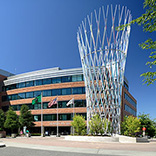Healthier lives for every person in every community.
At Fred Hutchinson Cancer Center, we’re driven by the urgency of our patients, the hope of our community, and our passion for discovery to pursue scientific breakthroughs and healthier lives for every person in every community.
Gifts of all sizes help Fred Hutch turn innovation into action and offer new hope to people facing cancer and other diseases. We look forward to partnering with you to ensure your gift has the greatest possible impact in the area you care about most. If you’re interested in any of the priority areas outlined below, we would be happy to share more details.

"There's no greater reward than providing and prolonging human life and ending suffering. Philanthropy gives Fred Hutch the freedom to experiment, to look around the corners at other ways of approaching this disease.”
— Mark Fleischauer, Fred Hutch supporter
New molecular technologies are revealing insights about a dizzying number of variables that could affect an individual’s cancer risk and response to treatment. Precision oncology is the science and practice of transforming this deep and ever-expanding ocean of data into effective treatments, diagnostic tools, and risk-reduction strategies tailored to individuals. Philanthropic support enables researchers, clinicians, and patients to collaborate on increasingly personalized cancer cures for the next generation.

Through the Anniversary Challenge, your generous gift of $1 million or more — to support our physical expansion, drive the science it will make possible, and establish an endowed chair — will be matched by the Bezos family’s landmark 2022 gift. This is an opportunity to come together with other supporters to recognize Fred Hutch’s 50th anniversary and radically increase the pace and scale of innovation.
Contact philanthropy@fredhutch.org to learn more about the Anniversary Challenge.

Advances in screening and treatment continue to drive down rates of cancer deaths in the U.S. But as the population grows and ages, the sheer number of people living with cancer — along with its complications, the long-term effects of treatment, and the accompanying economic burden — is rising. Philanthropic gifts fuel research in specific disease areas, like breast, prostate, gastrointestinal, and blood cancers, and help ensure the best possible experience for everyone who comes to us for care. Learn more.

Our scientists are discovering new ways to tap into the immune system’s inherent disease-fighting power to target cancer without harming healthy cells. We have been at the forefront of this game-changing field of research since the 1970s, when Fred Hutch scientists pioneered bone marrow transplantation to treat previously incurable blood cancers. Private supporters have fueled every breakthrough, and donors are critical to accelerating development of the next wave of effective, enduring immune-based therapies.

No one is prepared for the complex and changing physical, psychological, and practical challenges that come with a cancer diagnosis. The burdens can quickly become overwhelming, especially for those who are already confronting systemic health inequities. Donor support enables us to help families facing cancer find housing and cope with financial, geographic, and other barriers that can make it difficult to come to Fred Hutch, participate in clinical trials, and get the care they need.

Our scientists strive to answer questions about the fundamentals of life, continuously expanding the edges of what’s known. We are deepening the understanding of how normal cells function and learning how disruptions cause cancer and other diseases. All this requires tenacity and uncompromising vision over years and even decades. And when it pays off — for example, when discovering a protein’s shape reveals its function in cancer — it benefits our lives in extraordinary ways. Donor support makes it possible for us to ask questions about health and disease that no one else asks, or even thinks to ask.

A person’s race, ethnic background, gender, or ZIP code shouldn’t determine whether they live or die or the quality of care they receive. For more than two decades, our researchers have been making inroads against inequities in treatment and outcomes for people with cancer and other diseases. Significant investments are needed to develop and strengthen partnerships that will improve prevention, screening, early diagnosis, and care; enhance the diversity of our faculty; and ensure better representation in clinical trials if we are to achieve our mission — not just for some people, but for everyone.

Even as we support the scientists making today’s discoveries, we are developing the young minds that will make tomorrow’s. Our immersive education programs connect trainees at every step of the academic journey with mentors at the top of their fields in scientific, data-focused, and research-adjacent careers, creating pathways to science that are open to all. Donor support for our outstanding educational opportunities, including our innovative workforce development internship and Postbaccalaureate Scholar Program, stokes dreams, strengthens science and care, and puts students on the path to a lifetime of discovery.

We believe that creativity and innovation thrive when researchers have resources, time, and freedom to pursue their ideas. That’s why we provide an unparalleled array of shared research resources, invest in emerging and enabling technologies and equipment, and foster a collaborative and open community. Donors who contribute to this priority foster a unique environment where people share ideas, science builds on science, and researchers take risks.

Unrestricted gifts allow us to quickly respond to new opportunities and advance high-risk ideas that could lead to breakthroughs. This flexible funding is also essential to providing the space, resources, and stability our researchers and clinicians need to advance science and care standards. From streamlining faculty recruitment to enhancing supportive care for patients, gifts toward greatest needs fuel mission-critical activities that help make life beyond cancer a reality.


“It's actually the risky projects which have the bigger chance of completely changing paradigms. Multiple labs at the Hutch are changing textbook definitions about what we know about biology, and that's bound to have a profound impact on how we understand life and how we practice medicine.”
— Harmit Malik, PhD, professor and associate director, Basic Sciences Division, Howard Hughes Medical Institute investigator
